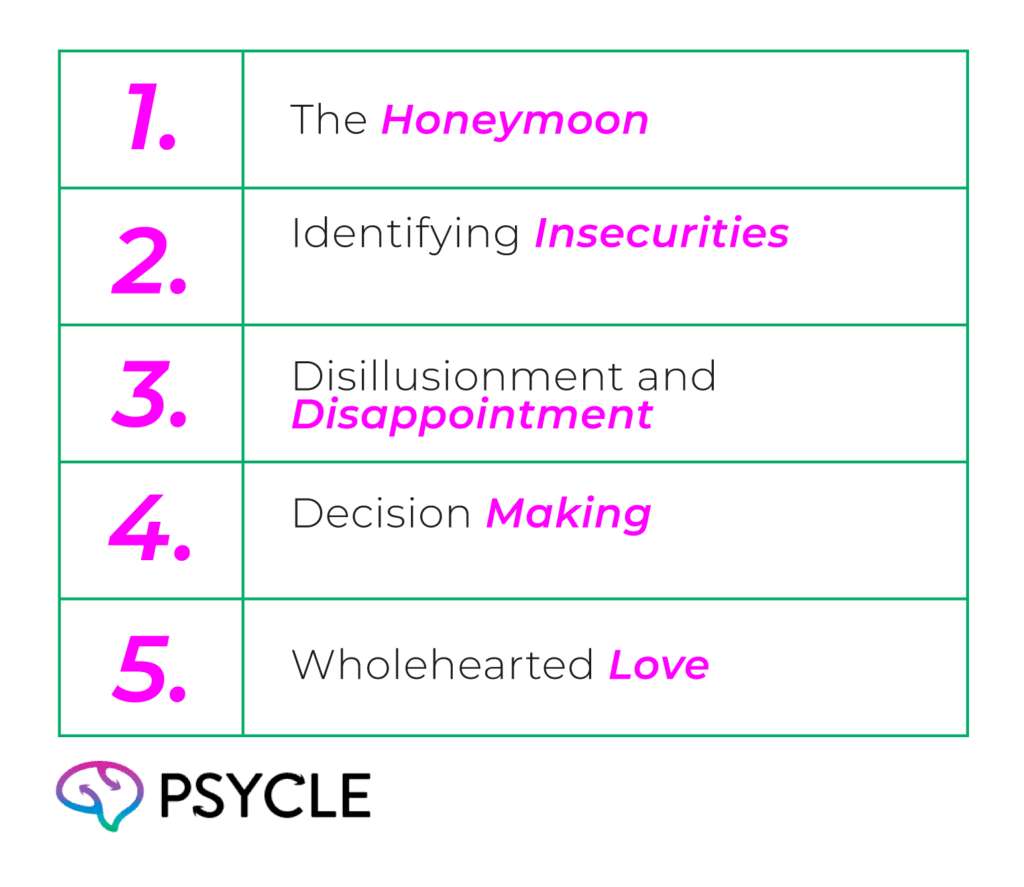Successful relationships don’t happen overnight. What are the 5 stepping stones in a relationship that can guide couples toward lasting love? These relationship milestones represent significant phases that couples experience as their bond deepens and evolves.
Each stage brings unique challenges and valuable lessons, creating the foundation for a healthy, enduring partnership.
@breakthepsycle_ Relationships grow in stages—emotional connection, challenges, and deep commitment. 💙 Communication and effort make the difference. Comment which stage you think is the hardest?👇 #Relationships #Growth #Love #mentalhealth #toxicrelationship #toxic #healthyrelationships
♬ original sound – Psycle Health
Key Takeaways
- Relationship milestones are essential markers of progress and development in a partnership.
- The emotional connection is the first stepping stone, establishing intimacy and creating a strong bond between partners.
- The identification of insecurities is the second stepping stone, where partners become aware of each other’s flaws and doubts may arise.
- Disillusionment and disappointment are the third stepping stone, where conflicts and arguments become more prominent.
- Making the decision to commit or break up is the fourth stepping stone, a crucial point in the relationship.
- The final stepping stone is wholehearted love, where couples accept each other and build a lifelong commitment.
- Effort, communication, and understanding are vital in navigating through the stages of a relationship and creating a stable and loving bond.
Exploring the Five Stepping Stones in a Relationship

Understanding these five stepping stones helps couples recognize where they stand in their journey together. These milestones shape how partnerships progress and grow, marking significant moments that define the relationship’s future direction.
Stage 1: The Honeymoon Phase – Emotional Connection
The first stepping stone centers on emotional connection, often called the honeymoon phase, serving as the bedrock for everything that follows. This foundation is characterized by intense emotions, heightened attraction, and the release of feel-good hormones like dopamine and oxytocin in the brain. Couples establish intimacy during this euphoric period, forming deep emotional connections that encourage vulnerability and openness. Partners share their innermost thoughts and feelings, creating space for genuine understanding.
This stage feels intoxicating and magical. Everything about your partner seems perfect, and you can’t imagine life without them. The emotional high during this period provides the momentum needed to weather future storms together.
Stage 2: Identifying Insecurities
The second stepping stone involves recognizing underlying insecurities as reality sets in. Partners become more familiar with each other’s daily habits, revealing flaws and vulnerabilities that weren’t visible initially. This discovery process sometimes triggers doubts and uncertainties as insecurities surface.
Couples need empathy and understanding during this phase. Rather than running from these revelations, successful partners offer support and reassurance. They recognize that everyone carries insecurities, and addressing them together strengthens the relationship rather than weakening it.
Stage 3: Disillusionment and Disappointment
The third stepping stone brings disillusionment and disappointment, also known as the power struggle or reality check phase, as the relationship matures. Conflicts become more frequent as the honeymoon phase ends, and arguments may feel more intense. Partners begin noticing aspects of their significant other’s behavior or personality that frustrate or disappoint them.
This stage tests the relationship’s foundation. Some couples interpret these challenges as signs of incompatibility, while others view them as natural growing pains. Addressing issues openly and honestly becomes crucial during this period, requiring both partners to work together toward resolutions.
Stage 4: Decision Making – The Crossroads
The fourth stepping stone represents a pivotal decision point, often occurring around the two-year mark, where partners must evaluate their relationship’s future. This critical juncture requires careful consideration and deep introspection about whether to commit fully or end the partnership.
Partners weigh the relationship’s challenges against its benefits, considering their long-term compatibility and shared goals. This is where many relationships end, as studies show this is a critical make-or-break point that determines long-term relationship success. The decision shapes everything that follows, often determining whether the relationship survives and thrives or comes to an end.
Stage 5: Wholehearted Love – Complete Acceptance
The final stepping stone embodies wholehearted love, where couples reach a place of complete acceptance. Partners have journeyed through previous challenges and arrived at a deeper understanding of each other. They embrace imperfections while committing to building a lifelong bond based on mutual respect, trust, and unwavering support.
This stage represents relationship maturity. Love becomes less about passion and more about partnership, creating a stable foundation for the future.
Alternative Perspectives on Relationship Stepping Stones
While the emotional progression model provides valuable insights into relationship development, other frameworks offer different perspectives on what are the 5 stepping stones in a relationship. Some relationship experts focus on practical milestones like exclusivity, meeting each other’s inner circle, taking significant trips together, moving in together, and engagement or long-term commitment.
Another common framework emphasizes foundational elements: trust, communication, teamwork, comprehension, and commitment. These models highlight how relationships build through concrete actions and shared experiences rather than purely emotional stages.
Each framework offers unique value depending on your relationship style and priorities. Some couples may progress through practical milestones while simultaneously experiencing emotional growth phases. Others might focus primarily on building foundational skills that support their partnership’s long-term success.
Understanding these different approaches helps couples recognize that relationship development isn’t one-size-fits-all. Your journey might incorporate elements from multiple frameworks, creating a unique path that works specifically for your partnership.
Nurturing a Lasting and Loving Relationship
Navigating these stepping stones successfully requires intentional effort and commitment from both partners. Relationship development and growth depend on three fundamental elements that couples must cultivate consistently.
The Power of Continuous Effort
Effort drives meaningful relationship development. This means actively working to understand each other’s needs, desires, and aspirations rather than taking the partnership for granted. Partners demonstrate their commitment through consistent actions, showing dedication to making the relationship work even during difficult periods.
Small gestures often matter more than grand displays. Regular check-ins, surprise thoughtful acts, and prioritizing quality time together all contribute to relationship strength.
Communication as Your Foundation
Open and honest communication allows both partners to express feelings, thoughts, and concerns without fear of judgment. This transparency helps resolve conflicts before they escalate, builds trust between partners, and fosters deeper emotional connection.
Good communication involves both speaking and listening. Partners need to create safe spaces where difficult conversations can happen constructively, leading to better understanding and stronger bonds.
Understanding Creates Lasting Connection
True understanding goes beyond simply hearing your partner’s words. It involves comprehending their perspective, empathizing with their experiences, and respecting their feelings even when you disagree. When partners genuinely understand and accept each other, relationships flourish naturally.
This understanding develops over time through shared experiences, honest conversations, and patient observation. Partners learn each other’s communication styles, triggers, and love languages, creating deeper intimacy.
Building Your Future Together
Navigating the stepping stones in your relationship requires patience, commitment, and genuine care for your partner’s wellbeing. Creating a stable and loving bond demands continuous effort, open communication, and authentic understanding from both people involved.
Remember that these stages aren’t linear. Couples may revisit earlier stepping stones or experience multiple phases simultaneously. The key lies in recognizing where you are and working together to move forward with intention and love.
Your relationship’s success depends on how well you and your partner support each other through these natural progression stages. By understanding what are the 5 stepping stones in a relationship, you can better navigate challenges and build the lasting, loving partnership you both deserve.
FAQs
What are the Five Stepping Stones in a Relationship?
The five stepping stones in a relationship include emotional connection, identification of underlying insecurities, disillusionment and disappointment, making the decision to commit or break up, and wholehearted love. Each stage represents a crucial phase in relationship development.v
How Does Emotional Connection Affect a Relationship?
Emotional connection is crucial in establishing intimacy and forming a strong bond between partners. It allows couples to understand and support each other on a deeper level.
What Happens During the Disillusionment and Disappointment Phase?
During this phase, conflicts and arguments may become more prominent as partners start to see each other’s flaws. It is a challenging stage where both partners need to work through their differences.
How Important is Commitment in a Relationship?
Making the decision to commit or break up is a crucial point in a relationship. It signifies a willingness to work through challenges and build a future together.
What is Wholehearted Love?
Wholehearted love is when couples accept each other unconditionally and build a lifelong commitment. It is a deep and lasting bond that grows stronger over time.
How Can I Build a Stable and Loving Relationship?
Building a stable and loving relationship requires effort, communication, and understanding from both partners. It is important to navigate through the stages of a relationship with patience and empathy.
How Long Does Each Stepping Stone Last?
The duration of each stepping stone varies significantly between couples. The honeymoon phase typically lasts 6-18 months, while the disillusionment stage can extend from several months to over a year. The decision-making phase often occurs around the two-year mark, though timing depends on individual circumstances and relationship dynamics.

